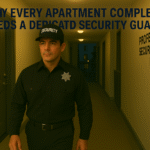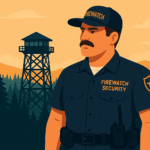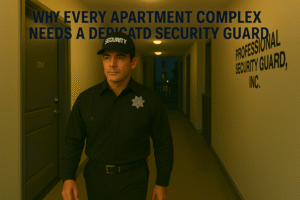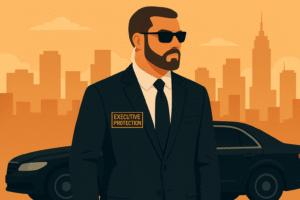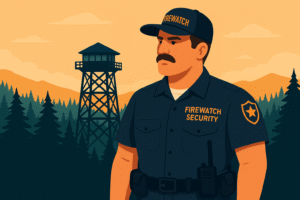You must have heard that “Behind every successful man there is a woman.” Now let me tell you something unique, “Behind every successful VIP stands a close protection VIP security.”
A person is considered a VIP if he enjoys an elevated status in society and is well-known for his influence or class..
With the ever-increasing rate of criminal activities comes the desperate need for close protection security services for these VIPs.
The close protection VIP security (a bodyguard or a team of dedicated individuals) is committed to providing security and ensuring the protection of high-profile people such as political figures, celebrities, business executives, etc and their families who are at a higher risk of harm due to their public image or status.
The significance of a close protection system cannot be underestimated. There is a high possibility that high-profile individuals are targeted by criminals, terrorists, or groups with malicious intent. The security breach will not only cause harm to the VIP but could also endanger the lives of their friends, families, or colleagues.
In this article, we’ll delve deep into the concept of close protection VIP security. So, buckle up, get ready, and stick till the end.
Understanding Close Protection/VIP Security
Who requires Close Protection/VIP Security
Eminently, famous people who are challenged with threats and intrusions in their daily life are the people who require close protection security the most. For example, politicians that fear kidnapping or assassination or celebrities that are followed and stalked by their obsessive fans need protection to enjoy their safety and personal space.
Also, people who wish to keep intruders away or avoid unnecessary interactions and interferences and walk through the crowd safely and securely may need these security services.
Similarly, merchants or high-end retailers that carry valuable goods or heavy cash with them may need protection from being followed, watched, and robbed. The Guards can facilitate the transportation of goods, provide surveillance, and ensure the goods are transported safely.
It is worth mentioning here that even ordinary people may need security if they are at a heightened risk due to some professional or personal reasons.
Threat Assessment and Risk Analysis
Threat assessment and risk analysis are the basic yet most important aspects of a close protection security system.
By identifying potential threats, analyzing the extremity of the threats, and collaborating with VIP, security personnel prepares a close protection security plan. This involves assessing risks of physical harm, kidnapping, extortion, cyber-attacks, or any other form of threat that could harm the VIP or their reputation.
An account of VIPs’ daily routine, travel plans, public appearances, etc helps to evaluate the probability of possible threats and develop security measures accordingly.
C. Designing a Close Protection/VIP Security Plan
Designing and implementing a security plan that is tailored to the specific needs and risks of the VIP enables the close protection teams to provide high-profile individuals with the security they need to go about their daily lives with confidence.
The first step is to conduct a thorough threat assessment and risk analysis to identify the threats and vulnerabilities that need to be addressed.
As soon as potential risks are identified, the close protection team can devise a comprehensive security plan that includes physical protection, surveillance, and risk mitigation.
Among these measures would be the deployment of a team of close protection officers to provide 24-hour security, establishing secure transportation arrangements, and instituting access control measures to minimize the risk of unauthorized access. As part of the security plan, officers can also dress in plain clothes acting as undercover officers.
Lastly, the security plans must be regularly reviewed and updated to remain effective and relevant. Performing regular threat assessments, revising security protocols, and adjusting the level of protection can all contribute to this.
Key Components of Close Protection/VIP Security
Physical Security
Physical security is the most crucial element of close protection VIP security service. It is the core responsibility of the protection team to safeguard VIPs at all costs.
Physical security in this context includes transportation security, residence security, and event security. This is accomplished through armored vehicles, advanced access control systems, perimeter security, and advanced surveillance technologies. With these measures in place, close protection teams can minimize the risk of physical harm or unauthorized access to their clients.
Information Security
Information security is yet another critical component of close protection security.
All staff members, including investigators, drivers, and security personnel, undergo background checks to ensure that they do not have a history of criminal activity.
In addition, the use of secure servers, password-protected databases, or other digital security measures also helps to secure the sensitive information of the client.
Furthermore, maintaining a low profile and avoiding public disclosure of sensitive information are crucial aspects of information security for high-profile clients. Avoiding social media posts, minimizing public appearances, and speaking publicly about sensitive topics can be part of this strategy.
Communication Security
While information security pertains to protecting personal and professional information, communication security refers to protecting the confidentiality and integrity of communication between a client and their security team.
Secure communication methods may include encrypted messaging apps and secure telephone lines, clear communication protocols, and maintaining situational awareness in order to prevent interception of communication over open channels.
Emergency Response Planning
A well-prepared emergency response plan is key to ensuring the safety and well-being of high-profile clients in close protection and VIP security.
Close protection teams can minimize the risk of harm to their clients and provide a fast, efficient response in an emergency situation by developing comprehensive plans and regular training and drilling.
For example, evacuating the client to a safe location, contacting law enforcement, and implementing security measures to prevent security breaches.
Close Protection/VIP Security Team
Qualifications and Training of Close Protection Officers
In the USA, close protection officers also known as Executive Protection Agents (EPAs) are required to possess a combination of qualifications and training to provide close protection security to high-profile clients.
It is common for EPAs to have a background in law enforcement, military service, or private security. With this experience, they can be equipped with the skills and knowledge they need to make quick decisions in potentially dangerous situations.
EPAs must also complete rigorous training that meets the National Protection and Programs Directorate (NPPD) standards of the Department of Homeland Security. Among the skills covered in close protection training are:
- Threat assessment
- Advanced vehicle techniques (defensive driving)
- Operational planning and investigation
- Search procedures
- Combat techniques
- Firearms proficiency
It may be necessary for EPAs to obtain additional training and certifications from state agencies before they can be licensed. California, for instance, requires EPAs to maintain their licenses by completing 14 hours of continuing education each year.
The right qualifications, rigorous training, and ongoing education enable close protection officers to provide their clients with the highest level of security and protection.
The Role of the Security Driver
Security drivers are usually the first line of defence when protecting their clients, so they need specialized training in defensive driving, evasive maneuvering, and emergency response.
In addition, they need to have a thorough understanding of the routes and locations they will travel through, as well as the ability to adapt quickly to changes in traffic and other situations that may arise.
Besides driving skills, security drivers must also have excellent communication skills, since they will be coordinating with other team members and the client. It is also essential that they have the ability to identify and avoid danger or take evasive action when it comes to potential threats.
They are also responsible for maintaining the vehicle’s security and safety at all times. This includes keeping the vehicle adequately maintained and equipped with the necessary safety features.
As part of their duties, they must also perform routine inspections to ensure the vehicle is in good working order and that there are no potential hazards that may harm the client.
The Role of the Advance Team
In the United States, the advance team plays a key role in protective services for high-profile clients. Advance teams usually consist of security officers, logistics coordinators, and other support staff. As part of their duties, they may coordinate with local law enforcement and security agencies, inspect venues and locations where VIPs are to visit and arrange transportation and accommodations for them.
The members of the advance team are mainly responsible for conducting a thorough site survey of the client’s destination to identify any potential vulnerabilities or hazards.
Their coordination with local law enforcement and emergency services allows them to respond promptly in case of an emergency. To mitigate disruptions caused by the client’s arrival, they may also need to contact local businesses and residents.
Aside from ensuring that all necessary security protocols are in place, the advance team must ensure that communication systems are working properly and that access control measures are in place. It is also necessary for them to develop emergency plans in case of security breaches or other emergency situations.
The Importance of Teamwork
Each member of a close protection team has specialized skills and expertise that contribute to the overall security of the client. Their collective work and strong bonding can be extremely beneficial in the accomplishment of their security objectives.
For example, when the team members have effective and swift communication one member can escort the VIP client through the crowded area while the other can focus on coordinating with the law enforcement team to ensure that the route is clear and safe. On the other hand, the third member can watch out for potential threats across the crowd.
Also, every team member brings a different set of skills and experiences to the table, so it is essential that everyone works cohesively and trusts each other in order to carry out their duties effectively.
Technologies and Tools Used in Close Protection/VIP Security
A. Body Armor and Personal Protective Equipment
Bulletproof vests, also known as body armor, are designed to provide protection from firearms and other ballistic threats. Security professionals commonly use Level IIIA body armor in the United States because it offers protection against most handgun rounds.
Additionally, personal protective equipment (PPE) can include helmets, gas masks, and protective eyewear. These tools protect security personnel from various threats, including physical assault, chemical or biological agents, and debris from explosions.
B. Communication Devices
Communication devices are absolute must-have tools for security professionals to provide close protection to high-profile people. They help them communicate and coordinate effectively thereby increasing security efficiency.
Encrypted radios, satellite phones, and GPS tracking systems are some of the advanced and sophisticated communication devices. In addition, professionals also use personal devices such as earpieces and microphones allowing discrete and effective communication among team members.
C. Surveillance and Monitoring Equipment
When it comes to close protection VIP security, surveillance and monitory equipment is an indispensable tool. Monitory equipment such as security cameras helps the guards to keep an eagles eye on their surroundings thereby detecting any danger that could possibly occur.
There is a wide range of surveillance tools from high-tech cameras to motion detectors and listening devices that aim to provide an extra layer of comfort and protection to clients.
D. Non-Lethal Weapons
Non-lethal weapons like stun guns, tasers, pepper spray, rubber bullets, and batons are used to repel attackers without causing permanent harm or death. These tools allow the security team to defend themselves and their clients while giving them some time to analyze the situation and act accordingly.
If used appropriately these weapons can dramatically play their role in ensuring the safety of VIP clients and their guards.
Legal Considerations in Close Protection/VIP Security
A. International and Domestic Laws
Close protection and VIP security require strict compliance with both domestic and international laws. Armed conflicts are governed by international law, such as the Geneva Conventions, which establish rules for the treatment of prisoners of war and civilians.
Each country’s domestic laws vary and may include regulations covering firearms, self-defence, and force use.
These laws and regulations must be understood by security personnel in order to ensure that their actions are legal. Neither the security team nor their clients can escape legal consequences for violations of these laws.
B. Liability and Insurance Considerations
VIP security and close protection require careful consideration of liability and insurance issues. A security personnel or client may be held liable for damages or injuries resulting from an incident, such as an attack or accident.
This risk can be mitigated by ensuring that security teams carry liability insurance and their clients carry adequate insurance coverage. It is also important to train security personnel to minimize the risks of incidents and respond appropriately in case of an emergency.
C. Protecting Confidential Information
It is common for close protection agents and VIP security personnel to handle confidential and sensitive information. It is imperative that security personnel take steps to prevent unauthorized disclosure of this information.
As a result, secure communication protocols may be implemented, sensitive information may be limited, and team members must be aware of their confidentiality responsibilities. Security teams and their clients can be legally liable if they fail to properly protect confidential information.
Providers of Close Protection for VIPs
A. Government Agencies
Government agencies are often the go-to provider when it comes to the highest level of protection. Listed below are the best VIP protection agencies in the United States.
- The United States Secret Service
- The Diplomatic Security Service
- The Federal Bureau of Investigation
- The Department of Homeland Security
- The United States Capitol Police
B. Private Executive Security Companies
Some of the notable private executive security companies in the US are:
- Gavin de Becker & Associates
- AS Solution
- Blackwater USA
- Pinkerton
- Global Guardian
- Hillard Heintze
- Triple Canopy
- Executive Protection Institute
- International Protective Service Agency
- International Intelligence Limited
C. Military and Ex-Military Personnel
- Blackwater USA
- Academi
- DynCorp International
- Triple Canopy
- G4S Secure Solutions
- Olive Group
- Aegis Defence Services
- Control Risks
- GardaWorld
D. Freelance Close Protection Officers
Individuals who work as freelance officers offer their services to VIP clients on a contract basis. Their personalized security solutions can be of great value to VIP clients.
They are able to customize their services to suit their specific needs and preference, especially for high-profile individuals with unique security concerns.
The most important thing is, however, to carefully evaluate potential providers before hiring them.
E. Factors to Consider When Choosing a Close Protection Provider
In the USA, selecting a close protection service provider involves several important considerations. To stay on top of things, consider these points:
- Experience: Ensure that your provider has a successful track record in close protection. Verify their credentials and previous experience providing high-profile clients with close protection.
- Reputation: Do some research and find out about the reputation of the service provider by reading their past client’s reviews and testimonials.
- Training and Qualification: Check thoroughly whether the company offers certified, skilled and trained professionals that meet industry standards.
- Confidentiality: Do check out does the provider have strong rules and policies to safeguard the confidentiality of the VIP.
- Insurance: Providers should have adequate insurance coverage and liability protection to ensure both clients and providers are protected.
- Flexibility: Adapting to changing circumstances and client needs should be a hallmark of a good close protection provider.
F. Advantages and Disadvantages of Each Provider
Choosing a close protection provider requires weighing the advantages and disadvantages of each.
For example, despite offering advanced resources and training, government agencies are limited in flexibility and personalization.
While private security companies offer customization and flexibility in executive security services, they may not have access to the same resources as government agencies.
On the other hand, despite extensive training and experience, military and ex-military personnel may not have the same legal protection as government agencies.
Although freelance close protection officers offer flexibility and cost-effectiveness, they may lack the same level of training and resources as other providers.
Hence, the VIP’s particular needs and circumstances must be carefully considered when choosing a close protection provider.
Conclusion
Safeguarding VIPs is a multilayered process that requires highly trained professionals working in tandem.
This article clearly explained that security in close protection is more crucial than ever before from advanced planning and risk assessments to advanced technologies and strong emergency response plans. Whether it’s government agencies, private security firms, or freelance officers, selecting the right provider is all that matters. Additionally, you can always reach out to report any of your complaints here.
In the end, it’s all about ensuring VIPs are protected by the best in the business so that they can focus on their work and passions.

